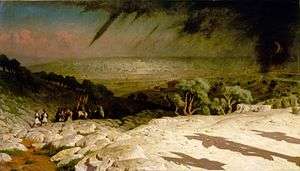Jerusalem (painting)
Jerusalem (French: Jérusalem) is an 1867 painting by the French artist Jean-Léon Gérôme. It is also known as Golgotha, Consumatum Est and The Crucifixion (La Crucifixion). The foreground depicts the ground of Golgotha with the shadows of three crucified men: Jesus and the two thieves. Further back in the picture is a crowd of people moving away from the scene. In the background is the city of Jerusalem under a cloudy sky.
| Jerusalem | |
|---|---|
 | |
| Artist | Jean-Léon Gérôme |
| Year | 1867 |
| Medium | Oil on canvas |
| Dimensions | 82 cm × 144.5 cm (32 in × 56.9 in) |
| Location | Musée d'Orsay, Paris |
It was characteristic of Gérôme to depict not a violent event itself, but the aftermath of such violence; see The Death of Caesar, The Execution of Marshal Ney, and The Duel After the Masquerade.
The painting marked Gérôme's return to history painting after a period of exploring orientalism. Like much Christian art of the era, the depiction was influenced by Ernest Renan's Life of Jesus.[1]
The painting was presented at the 1868 Salon. Since 1990 it is located at the Musée d'Orsay in Paris.[2]
References
- "Jean-Léon Gérôme: Jerusalem". Musée d'Orsay. Retrieved 2016-11-13.
- "Jérusalem: Notice de l'œuvre" (in French). Musée d'Orsay. Retrieved 2016-11-13.